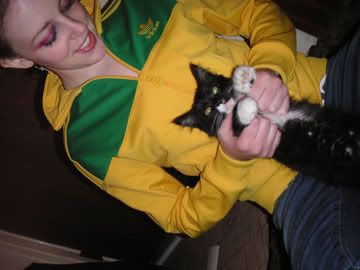I decided to read Orlando for a few reasons:
1. Like many feminists, I was brainwashed by the evil of "A Room of One's Own."
2. I read, and enjoyed, Mrs. Dalloway (in a class with Paul Dresman presiding, one of my faves).
3. In my blog reading, someone somewhere called Orlando something of a science fiction novel. In the past year I have started reading sci-fi (I know, I know, what have I been doing all of my life?), so I thought it would be interesting to look at this novel with that frame.
1. Like many feminists, I was brainwashed by the evil of "A Room of One's Own."
2. I read, and enjoyed, Mrs. Dalloway (in a class with Paul Dresman presiding, one of my faves).
3. In my blog reading, someone somewhere called Orlando something of a science fiction novel. In the past year I have started reading sci-fi (I know, I know, what have I been doing all of my life?), so I thought it would be interesting to look at this novel with that frame.
Orlando, in the beginning of Woolf's tale, is a man with a rich family heritage—literally, rich. He lives in a massive estate, has oodles of servants, and wears fancy clothes (among other things). He desperately wants to be a poet, however, but can't figure out how to do it, considering the constriction of wealth. He winds up in Turkey to serve an ambassador, where he marries a whore and is assumed killed after a conflict.
Well, he's not dead; he took a long nap and woke up with a new body, of the female sex. From here, she lives with some Gypsies and rekindles her love of the outdoors, and comes to understand what is important in life (as it turns out, the Gypsies are not at all impressed with her family's land holdings or wealth). She eventually goes back to England, rekindles some old relationships (one with another gender-switcher), and time-travels to Victorian England, where her main pursuit is a husband (remember, everyone was stuffy back then). Things happens, she finds a husband, and she ends up in modern day England (1928). I'm being purposefully vague, but I also don't remember the latter part of the book as much as the first three quarters. I was a bit bored (which I don't want to admit! I love Woolf)!
One of the most intriguing things about this novel is that Woolf wrote it about one of her close friends, Vita Sackville-West (not to be confused with a Sackville-Baggins hobbit). Woolf modeled the Lady Orlando on her, even using Sackville-West's relationship with a lovely lady as the basis of Sir Orlando's crisis (his with the Russian fox Sasha). I suppose that is the easy way to skirt the reality of Sackville-West's bisexuality; Woolf did write this in the 1920s, after all.
My complaint? Woolf has an opportunity to make a grand feminist statement. Because Orlando lives for a few hundred years, we should see how women's rights have changed. Woolf is the author of "A Room of One's Own," after all! But we don't see how Orlando's rights (property ownership, sexual freedom, access to education) change over the course of several centuries and a swap of sex. I really expected this to be hard-hitting—if Woolf did cover the rights and opportunities granted to each gender, I completely missed it. At one point in the novel, Orlando revels in her femininity after seeing how a flash of her calf nearly
killed a sailor (157). All that says, however, is that women's sole power is their sexuality or beauty. Even if that's true in that era, why not juxtapose that with Orlando considering how much power she had as a male, but didn't realize? There is just so much potential for a critique of the male privilege (but maybe Woolf was bored with the topic).
Petty feminist critique aside, I would recommend this book for the awesome time-traveling aspects. Who doesn't like time travel? If you said "ME!" you are a waste of cyberspace. But, as I wrote before, I got bored towards the end; perhaps I thought it was repetitive, and I expected more to happen. Nevertheless, I recommend one read this novel, especially once you consider the year it was written. Equal rights and time travel were two topics not discussed nearly enough, and Woolf was a great contributor to both. I also don't want to downplay the other themes we could discuss; this novel celebrates being a woman, considers what marriage really is, and the role of poet in society. Through my lenses, though, I feel the most pertinent point to bring up is the feminist one—and there is so much more to discuss about Orlando! But I've written enough.
KK
Next: Another biography, but this time, it's self-aggrandizing (obviously, it's of the auto- variety). It goes without saying, it was written by a man.
Petty feminist critique aside, I would recommend this book for the awesome time-traveling aspects. Who doesn't like time travel? If you said "ME!" you are a waste of cyberspace. But, as I wrote before, I got bored towards the end; perhaps I thought it was repetitive, and I expected more to happen. Nevertheless, I recommend one read this novel, especially once you consider the year it was written. Equal rights and time travel were two topics not discussed nearly enough, and Woolf was a great contributor to both. I also don't want to downplay the other themes we could discuss; this novel celebrates being a woman, considers what marriage really is, and the role of poet in society. Through my lenses, though, I feel the most pertinent point to bring up is the feminist one—and there is so much more to discuss about Orlando! But I've written enough.
KK
Next: Another biography, but this time, it's self-aggrandizing (obviously, it's of the auto- variety). It goes without saying, it was written by a man.
